
(Now expanded with my invaluable commentary!)
I've been systematically translating the Lunar interviews from Beep21, but there's news that I think can't wait. In the second part of his Eternal Blue interview, Kei Shigema talks about having drawn up a treatment for another Lunar - and it's not the story you might first think:
- Do you think you'll be able to be present the tale of the Four Heroes era (the so-called Lunar 0) touched upon in the PSP version of Silver Star in a game or other media?
Shigema: Lunar 0 has become a story of a bit different era!
As for the tale of the Four Heroes: the emotions and conflicts and fated bonds involved are released and resolved in Alex's story, so I don't think there's any need to depict it independently.
However, I'd like to write a little bit about Laike's story after the end of the game.
- Be honest: is there even a 0.1% chance of Lunar 3 in the future? I'm on pins and needles!
Shigema: I think the statute of limitations is up, so... (Actually, about 21 lines of grown-up stuff was deleted here...)
...So several years after the above was suspended, there were talks about whether we could now create a Lunar 0 about the details of how humanity moved to Lunar, and for consideration, we created a simple plot and characters. Mr. Kubooka even drew up rough sketches of the main characters.
These were just for consideration; they didn't go to production.
That means that, as for as the 0.1% chance goes: I don't think it's zero.
However: an extraordinary amount of manpower and funding is necessary to create an RPG from scratch in this day and age, and when I think of getting to the point of getting that all together, I think it would be enormously difficult.
I myself still want to hold out hope, so let's give Game Arts our support!
He also talks about his ideas on what may have happened after EB, which include a number of surprising concepts...
- What happened to Hiro and Lucia afterward?
Shigema: Welllll, I don't know—I suppose they went on a variety of adventures together?
Lucia may have awakened the Blue Star, but I don't imagine it would have revived immediately just like that. I wouldn't be surprised if an exhausted Hiro & Lucia had two or three more adventures on the level of Eternal Blue! Making new comrades from people sleeping on the Blue Star—maybe everyone on Lunar coming to help, of course. I also kind of doubt whether that would've really been the last we saw of Ghaleon-sama. And perhaps at the end of Hiro and Lucia's adventures, the frozen earth would have changed to green...
Shigema also thinks that the spiritual successor to Lunar has already been made:
Incidentally, while it's not a sequel to Lunar, Tales of Destiny 2 (TOD2) is its spiritual successor—its emotional heir.
I'd wanted overseas Lunar fans to play it, too, but, alas, there was no overseas release!
Abroad, Tales of Eternia was sold as "Tales of Destiny 2".
The role of TOD2's lengthy animated cutscenes; the expressions; the characters and story construction; the thematic material; the position of the heroine; the music production; and on and on—I think they're all connected fairly directly to Lunar. The element of romance between the characters etc. too is that way.
Particularly thematically, Lunar is, as an action-adventure tale, thoroughly about how the hero fights to save the girl he loves and saves the world in the process. With TOD2, we tried to go further and depict the decisions and growth of a hero forced to choose between the girl and the world.
Shigema is credited as a "script producer" on Tales of Destiny 2.
My response to all this can be summarized by this splendid editorial cartoon edit by political cartoonist pandorkful:
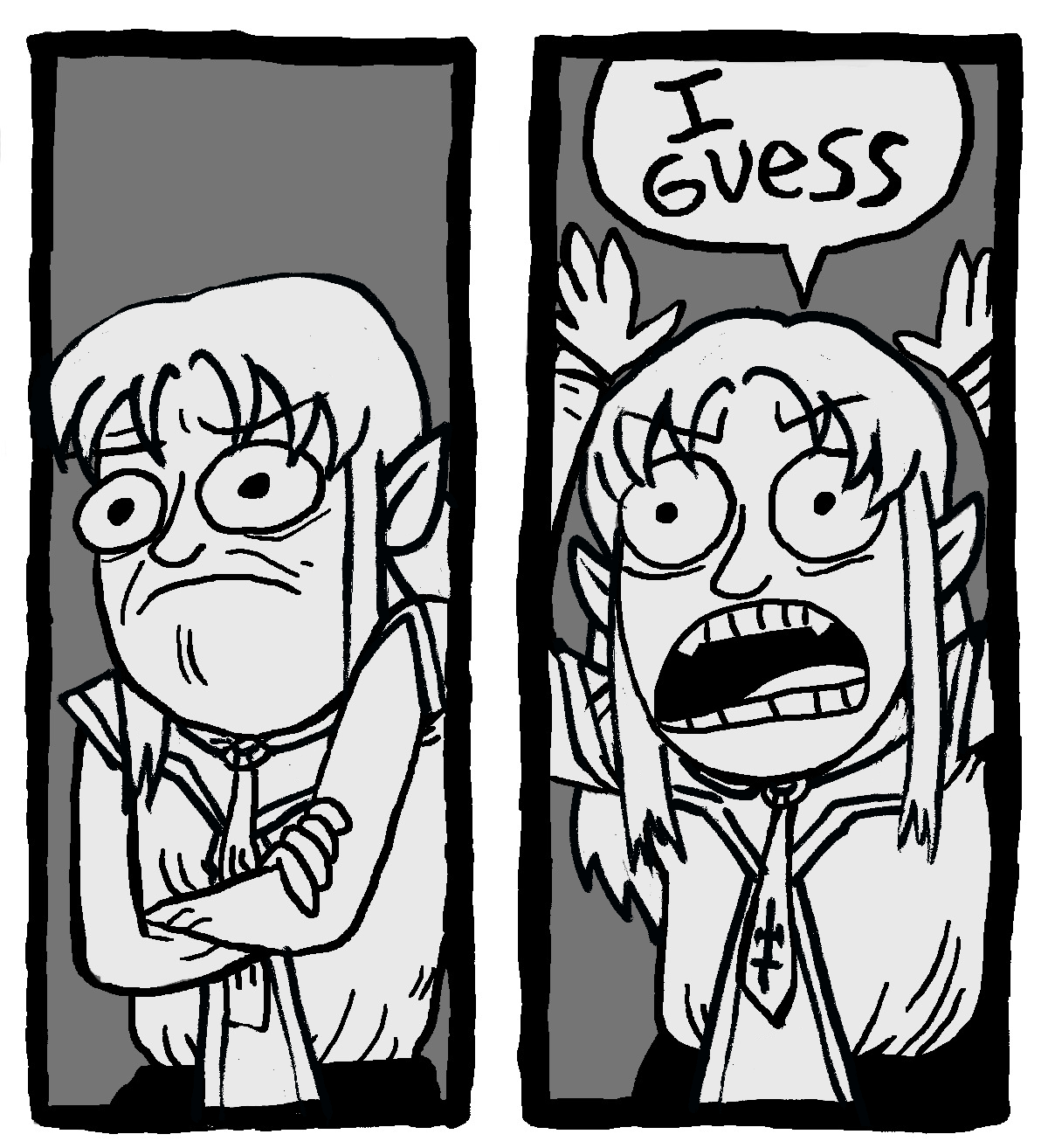
Going point by point:
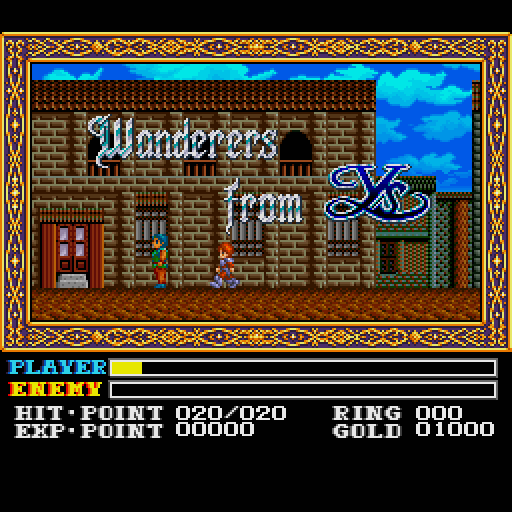
Hi! On a recent whim, I decided to act on an idea that had been percolating in the back of my mind for a while: "you know, I've finished Ys Book I & II, something few others can claim in this day and age, and it led to some rewarding discoveries; wouldn't it be interesting if I played the entire original Ys series, up to the point where it got reborn into an evidently rather standard, distressingly-competent anime action RPG series?" (I think that point is VI, right? Judging from individual release dates, it seems to be the rebirth of the series after a period where it had lain fallow, though there's another gap between VI and VII that suggests the actual start of the modern series may have been one volume later.) I had problems with Book I & II - like, big problems; like, problems that are never, ever brought up in modern conversations considering the esteem in which those titles are held and the infrequency with which they're actually played - but Ys, foundational Ys, is so formative, yet so little-explored, that I think it'd be instructive and archaeological, at the very least. Even when Ys missteps, it does so in ways that are either illuminating as to the challenges of the day or that are entertainingly bizarre.
(Well, entertaining in hindsight. It's not entertaining to run around half the map on increasingly shaggy-dog excuses because the game lost its homework and is trying to stall a suitable amount of time for the finale, but it makes for a good story after the fact.)
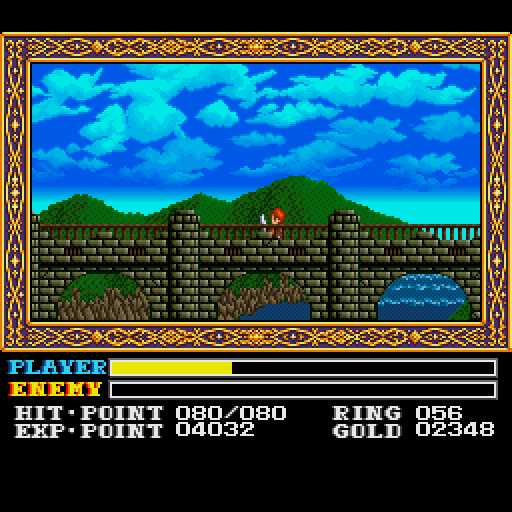
With all that in mind, I dove last week into the X68000 version of Wanderers from Ys. You may wonder why I chose such a relatively-obscure platform, and the answer is: Kimimi linked to the soundtrack, and it had absolutely sick music. Before this, I was actually considering playing the Genesis port - I was rooting around for an mp3 of Adol's theme a while back and discovered Sega had a killer version - but upon reflection, music aside, the X68000 seemed a better followup to my TG-16 I & II playthrough. Ys III released on one of the major console platforms runs the risk of being too...refined? Refined and like a grown-up game. As with Book I & II on the TurboGrafx, I'm looking for something more playable than PC-88 beep-boop slideshows, yes, but retaining the essence of the intriguing design decisions of the very first release.
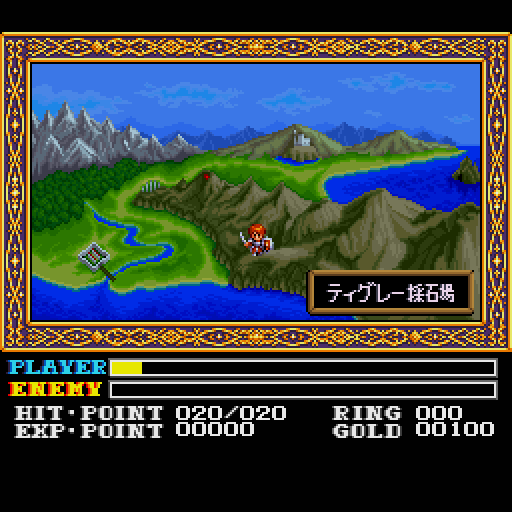
Plus: this version looks very nice. It's bright and colorful in that friendly, dumb-dog Ys way. Right after the adventure proper had gotten underway, and I found Adol standing on the suspension bridge at the quarry with the brilliant blue sky and wisps of clouds behind him, the dauntless chords of "The Boy Who Had Wings," one of the great pieces of video game music, playing - it was just great, the real start you'd want to your adventure.
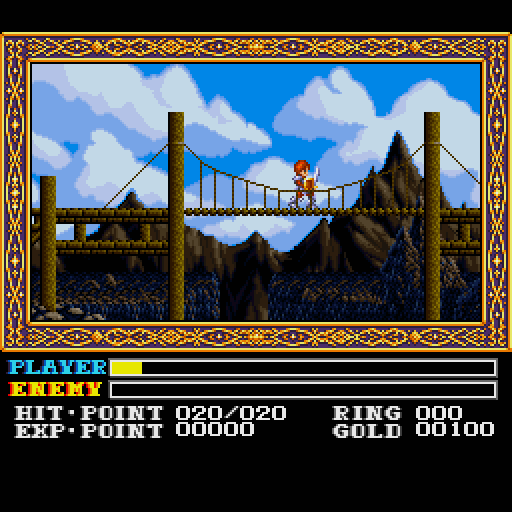
Given the persnicketiness of getting Mirrors to run on PC-98 emulation (which proved a big stopping point for me until Nebulous Translations came to the rescue with a complete package with all needed downloadables and instructions), I was preparing myself for a world of pain in emulating the X68000. I have to hand it to the developers of the XM6 Pro-68k emulator, though: it is as painless as painless could be for such a platform. You boot the emulator, load Disk 1 into Floppy Drive #0 and Disk 2 into Floppy Drive #1, and you're playing that sucker. I was dreading the task of getting a gamepad working, but all I had to do was plug in an Xbox 360 controller, and Adol was jumping and slashing - the buttons were mapped instantly. I discovered I had to use the keyboard to access the [I]nventory and [S]tatus screens, but this was an utterly negligible sacrifice for practical plug-and-play simplicity of use. This was an excellent emulator experience, and kudos to them.
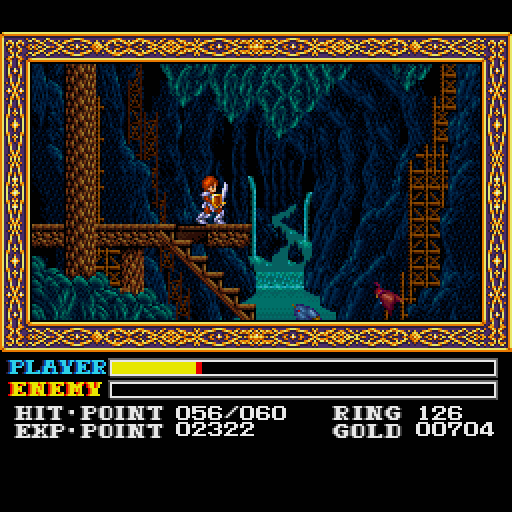
That user-friendliness and intuitiveness does not extend into the game itself, mind you. After my quest's auspicious start, I ventured into the quarry...and immediately got one-shotted by the very first little bug that touched me. See, just because Adol's sprite had changed to show him equipped with sword and shield after he left the blacksmith in town did not mean he was actually equipped with sword and shield (and armor). While having to equip items is in line with the original Ys, yes, the misdirection of the sprite art, while a minor inconvenience, is still an eye-roller.
So I equipped everything, but this didn't really solve matters. I wasn't getting one-shotted, no, but I was getting bodied, my full health bar near-completely drained in a split second. I was wondering why a creepy-crawly spider, the literal very first enemy, was still almost killing me even as fully-equipped as I could be at the start of the game, and then I realized: Ys III doesn't have i-frames. Zelda did in 1986.
Oh, yes. This is the old Ys I know, the series whose legendary design prowess gave us bump combat.
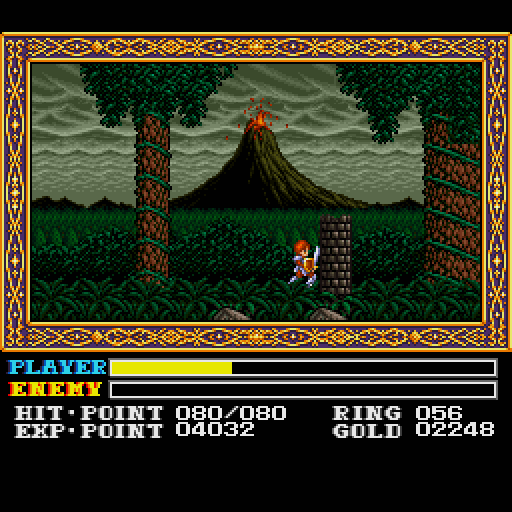
Ys III's combat philosophy seems to be: you are glass until you grind up to the specified level for the given area, whereupon you are indestructible and will one-shot everything (as I did once I hit Level 3 in the quarry). The game uses a wholly-new-for-the-series side-scrolling presentation inspired by Zelda II, but victory and defeat are still as binary in the Ys universe as they are with bump combat. For example: when I initially encountered the first boss, he would kill me with one hit. He had patterns to learn, and I eventually got to the point where I could survive a good long while, but my skill was in the end irrelevant, as getting hit ultimately proved unavoidable with the number of projectiles he unleashes as his health bar drains, and everything one-shotted me. Had I been allowed to tank even one more hit, it could have been a tough-but-fair battle. Instead of observing an enemy's behavior and employing deft dodging and tactics, though, the answer was just: grind until you render the fight trivial. One more level and an armor upgrade, and I went from instant defeat to killing the boss in literally under a second. It's another one of those utterly-bizarre, anachronistic Ys design decisions: the devs put in learnable patterns, but they didn't go so far as to make mastery of those patterns matter.
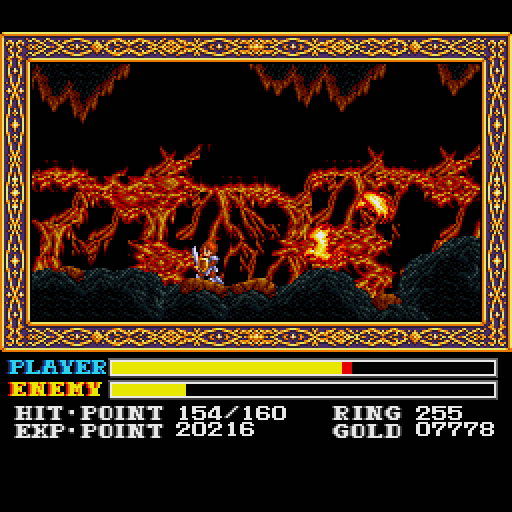
Then I progressed to the second area, a fire temple, and not only was Adol as fragile as he was at the start of the first area, but the requisite grinding proved quite perilous, as the enemies were launching screaming fireballs at me from offscreen. As dodging proved near-impossible, the only reliable way to avoid getting creamed was to...slither along on Adol's stomach, crawling under the fireballs, until my foes were in sword's range. I mean, kudos for allowing an ARPG hero to crawl in the first place, since you can usually only duck while stationary, but - I'm storming lost ruins, flames racing around me, facing down deadly pyromancers, and...I have to inch along everywhere on my belly? Oh, Ys.
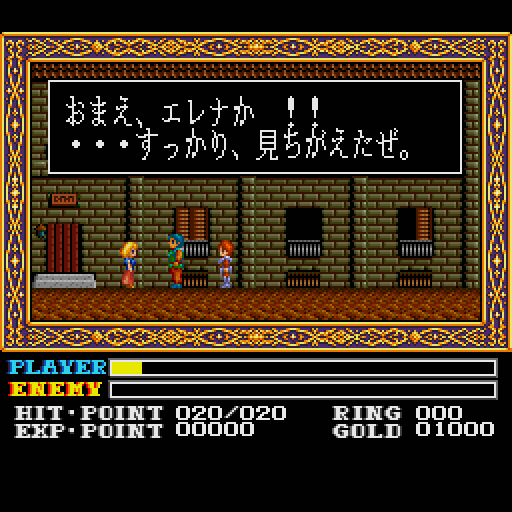
I haven't said much about the story. I've mentioned that I did play Ys III way back when, on a cartridge I got from Blockbuster's clearance bin, and while I don't remember much, I do recall the simple outlines of the simple tale: Adol's friend Dogi visits home; a brother of one of Dogi's old friends is acting weird; said brother is helping the king he serves resurrect a dark god or demon or other manner of final boss. There is something delightfully quotidian about Adol's friend Dogi wanting to show him his old hometown; Dogi running into people he used to know and them either noting how he's grown or (realistically) not having much time for him, too caught up in their own daily routines; Adol and Dogi checking into the inn; Adol noting how nice the room is and Dogi talking about how he used to work there, etc. I recall the brother and Adol are caught in a cave-in just to give them a chance to talk and Adol to ask "Hey, what's your big attitude problem, anyhow?", and I know Ys III devotes a gameplay segment to Adol and Dogi getting ready to leave in the morning after the adventure is concluded, a realistic touch I haven't seen elsewhere. The ins and outs of Adol & Dogi traveling and interacting and Dogi catching up with people and trying to iron out problems in Dogi's hometown take up more space than the grand quest stuff, and while this seems like a case of misdirected focus (the SNES version added an Ys I-type sequence where a fortuneteller foresees world-shattering disaster), it's oddly appropriate in its homeyness. It's a small story so far as RPGs go, but the game makes it work to an extent by telling it on a suitably small scale, one that pays attention to comfortably, relatably human interactions.
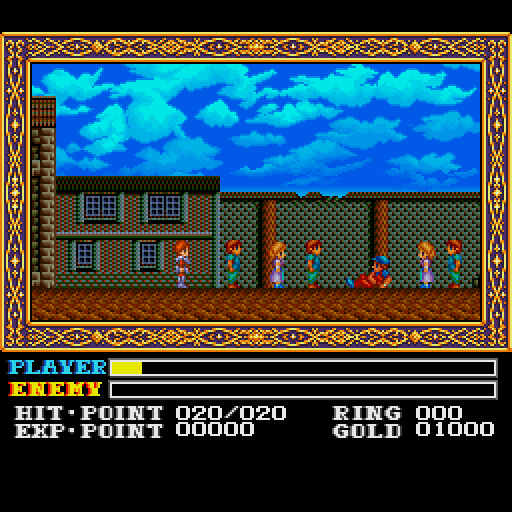
Now, you may wonder why I'm reporting on Ys III at the three-hour mark instead of upon its completion. Well, friends, let me tell you. At the end of the second ruins section, where disgruntled brother drops an eavesdropping Adol into a fiery pit, I came upon a giant chamber where boss music was playing but no boss was to be found. I wandered around the chamber a bit, confused, then headed back out to explore the rest of the fire pit, thinking I had missed something in my pre-grinding clamor. I did encounter a giant lava wall that prompted a warning upon approach; thinking that maybe finding the boss room before the obstacle defeating the boss was clearly meant to unlock screwed up some flag, particularly given the typical caliber of design prowess on display, I loaded an earlier save and took care to visit the chambers in what I thought was the right order. Still no dice, and no boss.
A bit of searching revealed another unfortunate soul - the aforementioned Kimimi herself, in fact - who had encountered the exact same problem a dozen years ago. The lone respondent, whose identity had been deleted in the intervening decade, claimed that it was a "bug" that happened "sometimes," whose origins they'd tried to trace "for hours" to no avail: "Once it happens, you'll have to start the game all over, I'm afraid."
So, absent further information or way to proceed, start the game all over I did - or rather, I attempted. Just in case the "bug" was the result of copy protection, I switched from the files in the huge X68K compilation I'd downloaded from archive.org to some I'd gotten previously off a ROMs depository. So I restarted, and I ground back up to Level 3, whereupon I went toward the first objective, and HA HA HA HA HA:
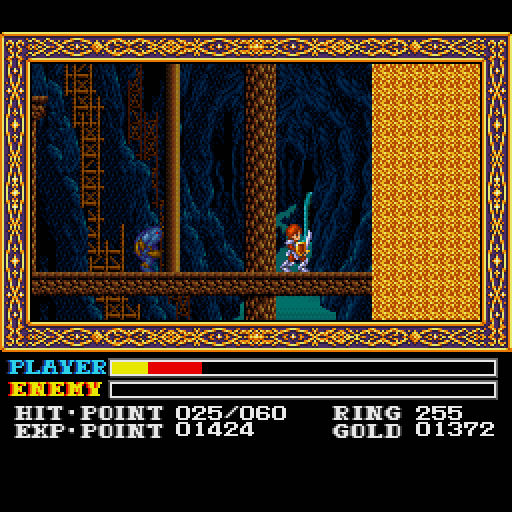
The wall, it is universally-agreed, is copy protection - a sign that the second set of files I had was not fully cracked. Further searching prompted by this new aggravation revealed speculation that the disappearing boss might be copy-protection as well. I lack the expertise to parse it fully; perhaps you'll fare better. (I can say that .dim vs. .xdf is not the key, as I was using the .dim files and still ran into problems.) In any case, my only paths emulationwise are to a) put another 2-3 hours into the archive.org copy to see if the fire boss refuses to show up again, or b) go around and download different copies from different sites and put time into them - which I doubt will bear fruit, as I imagine all these ROM depositories get their files from one another.

Now, there is an option, theoretically, to play the X68000 version legit via Project EGG, a Japanese subscription service for retro PC games. I say "theoretically" because the service, let us say, presents a number of hurdles. First, there's the issue of whether I'll be able even to pay with an overseas credit card, a habitual problem when dealing with online services based in Japan. Project EGG has an English-language page, but it hasn't been updated since the heady days of Windows 7. Second, even if I am eventually permitted to give them money, there's the question of how many amenities that are taken as a given in modern emulation will be available on Project EGG's service. Are there quicksaves? Is there screenshotting? Can I play the game fullscreen (integer scaling only, thank you)? Will I be able to use a gamepad? (The last is make-or-break for me. Trying to play an action game with a numpad, regardless of the original configuration, is not at all a fair test of its playability.) A look at their application's operating manual says "yes" to all four, which comes as an outright shock, but who knows how well it's all implemented. Not anyone who speaks English, evidently, since there's next to no info on using Project EGG on the English-language web!
Oh, did I mentioned that you have to pay both a monthly subscription fee and an individual purchase price per game? And we wonder why Steam has a stranglehold on the PC market.
Despite all this, attempting to crack Project EGG seems like a more promising route than Warez Warehouse Roulette, so I suppose the other half of this post is sitting on the other end of a 500-yen subscription fee. Failing that, it's back to the archive.org files one more time before sadly writing off the X68000 version for now and falling back on the Genesis version as a stopgap. Music and potential nonrepresentative professionalism aside, I actually kind of don't want to futz with the Sega version. Looking at it, it's too brown, the colors are washed out, the stupid fire-mouth enemies are replaced by the entirely *wrong* stupid fire-mouth enemies - it's wrong, it's all wrong! I want my little jewel-box PC presentation. So it's off to Project EGG, which I suppose is an expedition worthy of a report back in itself. Let's hope it doesn't end up like Skeb.
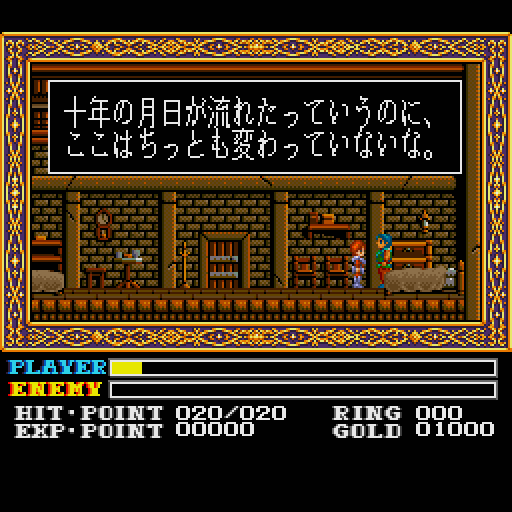
A game-related note before we go: Despite Dogi's prominence here and later in the Ys series, I cannot recall his role in the first two games. There was the scholar shown with the pendant in the opening, Luka or Luta Gemma, and there was the head of the thieves, and the guy who tried to rescue his girlfriend who was taken to the belltower in II, and the infamous Keith. That's it for notable male NPCs in Dogi's age range I remember. He wasn't the thief, was he? Seems like that would have come up more often subsequently. Someone busted down a wall by hand at some point, right? That seems like Dogi territory. I know Ys didn't set out to be one of gaming's longest-running series and is by necessity making things up as it goes along, but it's interesting - not "ha ha" interesting; just "it's weird how things go sometimes" interesting - that such an important character is in his first appearance completely unremarkable.
Prompted after happening upon yet another fake "debate" about the shifting meaning of retro, plus a reader email on Jeff Gerstmann's show about how more time has passed from the original Gears of War's release than some milestone or another; I couldn't be bothered to care.
Retro obviously encompasses more than 8/16/32-bit at this point, as time moves forward in a linear fashion and whatnot. Of the relatively-new-not-really proposals, I like the "at least two console generations" definition better simply because it's cleaner and more intuitive; the "ten years old" thing is too finicky, requiring you to hit up GameFAQs or Wikipedia for release dates, and that's before you get the "which region?" question involved. (That said, someone in the first discussion mentioned how stuff from the PS3 era isn't that far removed from modern sensibilities, whereas titles in the traditional "retro" window are of a period where the fundamentals were still evolving and therefore set themselves apart more distinctly in terms of gameplay and presentation - which is the most substantive comment ever to come out of these unfortunate affairs.)
I've found, though, that the substance of the argument really isn't the point with these proposals. The point of casually ("casually") bringing up "games released [x] years ago are retro, right? I mean, no one would care about anything so old, ha ha!", as with all the "Landmark Title was released HOW MANY YEARS AGO!?!?!?!?" posts on social media and all the extremely, extremely tiresome "OMG, WE'RE SO OLD" kabuki that follows (like, fucker, what do you want us to do???? it's not like we can turn back time???? if the conquistadors couldn't find the Fountain of Youth with all the gold in the Spanish empire, you're not gonna do it so you can feel better about Chrono Cross), is for the OP to project their mid-life or quarter-life or whatever-life crisis and invite you to mirror their own grief at their impending mortality and alleviate their suffering through schadenfreude. Like Shiori from Utena or crabs in a bucket, if they cannot transcend, everyone else must suck, and so we're invited to lament and feel guilty that we have survived this long, to atone for our continued existence, to agree that, yes, we all deserve death for daring still to draw breath.
Well, not me, fuckers! I turned 44 last week! I'm happy that I lived this long, and I look forward to living many more years and enjoying many more video games, whether or not they subscribe to your particular definition of retro. The only thing I regret is that we can't commemorate some video game birthdays without some sorry self-absorbed fuckers weaponizing their own Artax-grade self-pity to try drag everyone else down into their misery mire. We've had over 50 years of commercial video game history at this point. Think about how many stone-cold classics are celebrating an anniversary on any given day. I don't have the time to fit that much futile atonement in my schedule, and neither do you. And - here's the kicker! - even if you did, it wouldn't make the games, or you, any younger.
Mad about it? Well, in the venerable words of the GameFAQs scribes of old: Cry. Cry that I've lasted this long without the blessing of your ageist video game god, modeled in the image of your own self-hatred. Cry for me. Let your tears fall directly into my mouth and down my gullet so I may gain strength from your suffering. But if you want me to die, you'll have to get off your whining pansy ass and come shoot me yourself. And you won't, because you're too mired in passive impotence to take any action beyond feeling sorry for yourself.
Have fun with video games! I look forward to yet another post about how you're the very first person to discover Phantasy Star IV.
Gaming & hobby shop The Akihabara Container, which seems to specialize in hosting displays of limited-edition anime & gaming merchanidse, recently announced the pending debut of an installation dedicated to Clock Tower merchandise. It was originally scheduled to run November 3rd to the 23rd, but according to the store's Twitter, that's been delayed. In the meantime, we're left with this flyer:

Going roughly row by row, we have: mini mirrored magnets of the characters; lenticular acrylic keychains of memorable SFAM cutscene deaths; mini acrylic capsule-vended standees of SFAM sprites (well, Suspiria Anne and stumbled Jennifer aren't "standing," but you know; also, good to see Lotte represented appropriately, in an action pose); logo stickers; pins of Bobby's scissors, the demon idol, and Saidou's hannya; more acrylic character standees; an SFAM sprite art sticker sheet with characters, portraits, and items; a larger, metal-loop scissor keyholder; rubber keychains; a mug of the SFAM title screen that shows the SFAM logo when you fill it with a hot beverage; bath salts themed on the SFAM and Ghost Head bathtub scenes, tinted red and yellow and smelling like iron and sulfur respectively; a towel (a hand towel, presumably) of the celestial plate in Barrows Castle; a smartphone case; tote bags of the SFAM guide manga art and...I don't know what that is for the sequel—shears coming out of a TV?; a manga art door plate; a face towel of the SFAM box art; T-shirts (the last one's of guidebook manga art of Chinatsu/Stephanie); a hoodie of SFAM manga art; an alarm clock with the face of the SFAM Barrows Mansion clock tower clock that, despite old-school alarm-bell stylings, allegedly plays "Don't Cry, Jennifer"; a sundial with the Barrows clock tower clock face; and, finally, yet another acrylic standee of First Fear art.
That's a big wall of text that'd actually be even bigger if I made it a bulleted list, but I'd like to highlight the red and yellow iron and sulfur bath salts. They're not as high on the Innovatively Repulsive Merchandise scale as that Inside/RealDoll collaboration, but they're up there.
In other news, we have further confirmation of "Rolla" and "Anne," but "Bobby Ballows" kind of throws taking this as a definitive source out the window. (ETA: Never mind; apparently, they're using "Ballows" in the magnets. And also have Chinatsu's name wrong.) (ETA 2: And I now see they're using "Laura," with her novelization surname "Harrington," on the bath salt packaging. If the bath salt package designer took the English rendition of Laura/Rolla's name from the wiki, which took it from the novelization I translated, then I enjoy the idea that I'm indirectly responsible for the inconsistent nomenclature.)
And speaking of precedent: is Capcom/Sunsoft gearing up to do something with Clock Tower now? You don't set up pop-up shops with this wide an array of merchandise or release even throwaway stuff like that cheap phone "game" from a couple months ago (helpfully subtitled Ready for the Next, though you'd never guess it from this literally two-minute barely-interactive Flash trinket) without a Switch compilation incoming?
What do people do with acrylic standees? I understand their usefulness for in-store promo displays, but the decorative potential of a flat paper acrylic printout of character art seems limited, a very lacking substitute for a 3D figure.
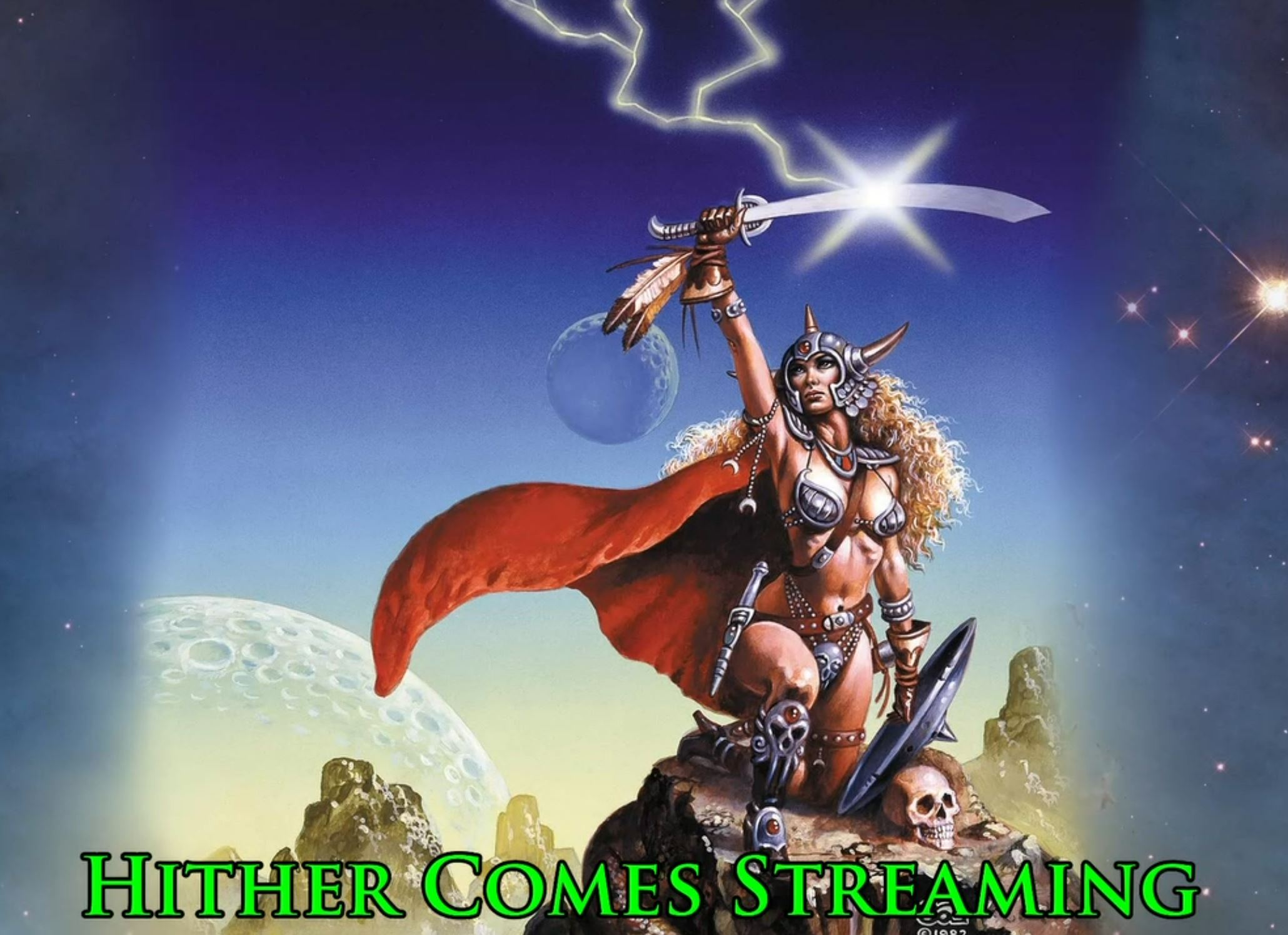
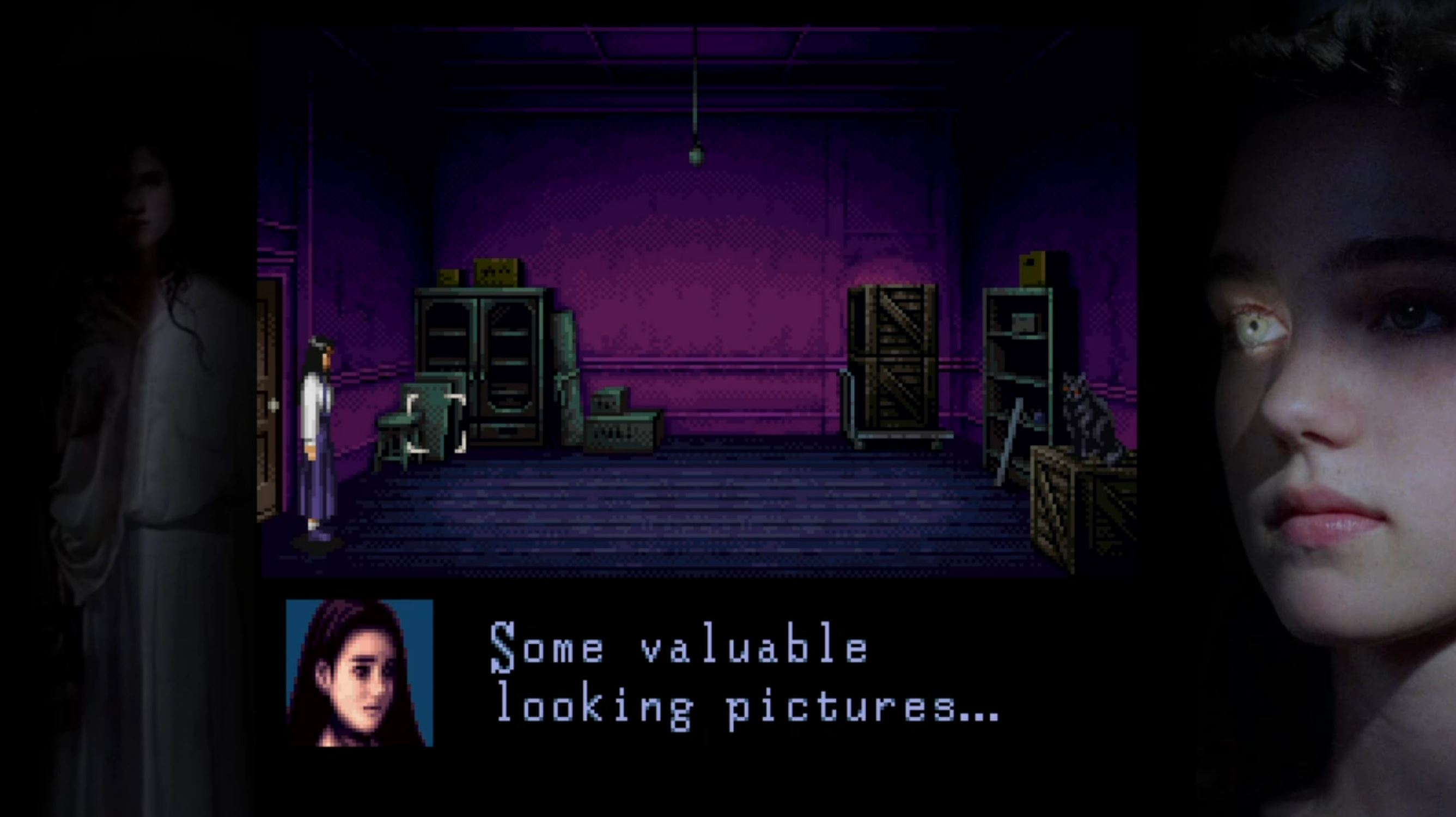
Turning to digital Clock Tower delights: a theatrical gentleman known only as THE BARD recently played through the Super Famicom adventures of Warrior Queen Jennifer Connelly in the inimitable style of an grand, accomplished storyteller. The boundless enthusiasm, curiosity, and relish with which the man approaches every title combined with the voice work in his narration makes every step of the games he plays seem like a grand adventure - and he even took the time to make Phenomena-themed bumpers. He goes in largely blind, save for a trial stream of the game a couple years before the main event, and he discovers every ending, S to H! The videos are available in the Highlights section of his channel, BardicBroadcasts, starting with the end of the video "Warrior Women on the Edge of Victory"; they're a great experience whether you're new to the title or it's one of your favorites. I'd love to see him tackle the PlayStation sequel someday, but I'm grateful for what we have. Hail to Connelly, slayer of the Children of the Great Father!

Page 21 of 56
